高分写作 虚拟语气
虚拟语气优秀句子摘抄
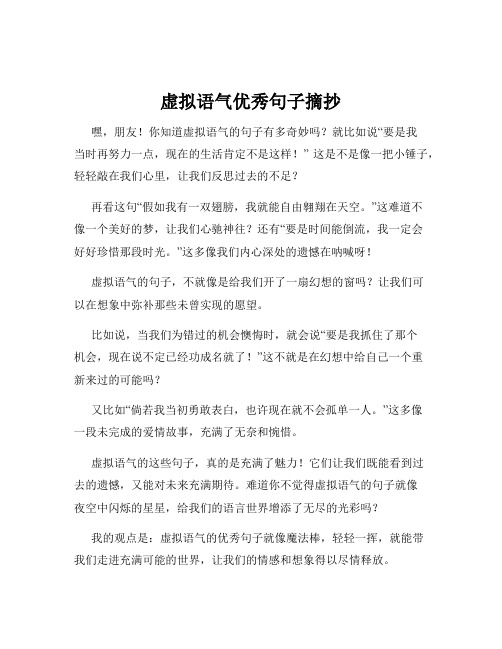
虚拟语气优秀句子摘抄
嘿,朋友!你知道虚拟语气的句子有多奇妙吗?就比如说“要是我
当时再努力一点,现在的生活肯定不是这样!” 这是不是像一把小锤子,轻轻敲在我们心里,让我们反思过去的不足?
再看这句“假如我有一双翅膀,我就能自由翱翔在天空。
”这难道不
像一个美好的梦,让我们心驰神往?还有“要是时间能倒流,我一定会
好好珍惜那段时光。
”这多像我们内心深处的遗憾在呐喊呀!
虚拟语气的句子,不就像是给我们开了一扇幻想的窗吗?让我们可
以在想象中弥补那些未曾实现的愿望。
比如说,当我们为错过的机会懊悔时,就会说“要是我抓住了那个
机会,现在说不定已经功成名就了!”这不就是在幻想中给自己一个重
新来过的可能吗?
又比如“倘若我当初勇敢表白,也许现在就不会孤单一人。
”这多像
一段未完成的爱情故事,充满了无奈和惋惜。
虚拟语气的这些句子,真的是充满了魅力!它们让我们既能看到过
去的遗憾,又能对未来充满期待。
难道你不觉得虚拟语气的句子就像
夜空中闪烁的星星,给我们的语言世界增添了无尽的光彩吗?
我的观点是:虚拟语气的优秀句子就像魔法棒,轻轻一挥,就能带
我们走进充满可能的世界,让我们的情感和想象得以尽情释放。
高考英语作文虚拟语气运用
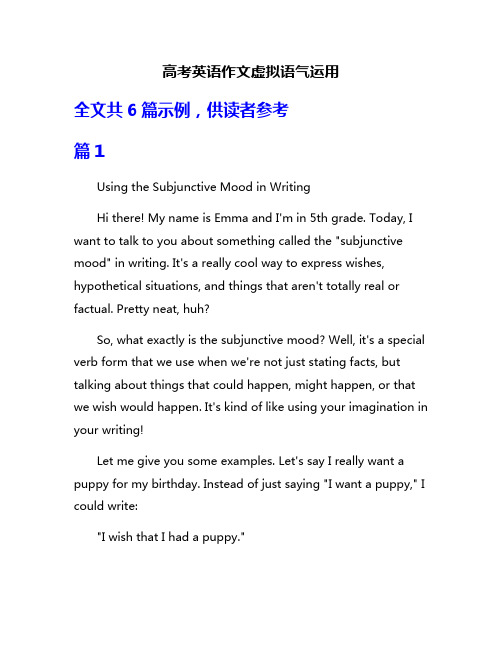
高考英语作文虚拟语气运用全文共6篇示例,供读者参考篇1Using the Subjunctive Mood in WritingHi there! My name is Emma and I'm in 5th grade. Today, I want to talk to you about something called the "subjunctive mood" in writing. It's a really cool way to express wishes, hypothetical situations, and things that aren't totally real or factual. Pretty neat, huh?So, what exactly is the subjunctive mood? Well, it's a special verb form that we use when we're not just stating facts, but talking about things that could happen, might happen, or that we wish would happen. It's kind of like using your imagination in your writing!Let me give you some examples. Let's say I really want a puppy for my birthday. Instead of just saying "I want a puppy," I could write:"I wish that I had a puppy."See how I used "had" instead of "have"? That's the subjunctive mood right there! By saying "I wish that I had a puppy," I'm not just stating a fact, but expressing a wish or desire for something that isn't currently true.Here's another example. Let's say my friend Jenny and I are planning a camping trip, but we're not sure if it will rain or not. I could write:"If it were to rain, we would have to cancel our camping trip."Again, I used "were" instead of "was" because I'm talking about a hypothetical situation – something that might happen, but hasn't happened yet.Isn't that cool? It's like you're bending the rules of regular writing a little bit to talk about things that aren't totally real or factual. It makes your writing more interesting and expressive!Now, let me share some more examples of how we can use the subjunctive mood in our writing:Expressing wishes:"I wish that I were taller.""If only I had a million dollars!"Talking about hypothetical situations:"If I were the President, I would make ice cream free for everyone.""If she studied harder, she would get better grades."Giving suggestions or advice:"It would be better if you left early to avoid traffic.""I recommend that he practice more before the game."Expressing necessity or obligation:"It is essential that we arrive on time.""It is imperative that he follow the rules."See how cool it is? With the subjunctive mood, you can make your writing more lively, imaginative, and expressive. It's like you're opening up a whole new world of possibilities!So, the next time you're writing a story, an essay, or even just a journal entry, try sprinkling in some subjunctive mood magic. It'll make your writing stand out and show off your awesome language skills!Alright, that's all I have to say about the subjunctive mood for now. Writing this essay has been a blast, and I hope youlearned something new and exciting! Keep practicing, keep exploring, and most importantly, keep having fun with writing!篇2The Magical World of "What If"Hi there! My name is Lily, and I'm a 10-year-old girl who loves learning about the English language. Today, I want to share with you something really cool that I learned in my English class – the subjunctive mood!Now, I know what you might be thinking, "Mood? Isn't that just about feelings?" Well, in grammar, a mood is a way of expressing the verb's attitude towards the action or state it describes. And the subjunctive mood is all about exploring the world of "what if" and imagining things that aren't necessarily true or real.Let me give you an example. Imagine if your teacher said, "I wish I were a bird so I could fly away from all these homework assignments!" Now, in that sentence, the verb "were" is in the subjunctive mood because it's expressing a hypothetical situation – your teacher isn't really a bird, but they're imagining what it would be like if they were.Isn't that cool? It's like the subjunctive mood opens up a magical door to a world where anything is possible!But wait, it gets even better! The subjunctive mood can also be used to express wishes, desires, and recommendations. For example, your mom might say, "I suggest that you clean your room before your grandparents arrive." In that sentence, the verb "clean" is in the subjunctive mood because it's expressing a suggestion or recommendation.And here's another example: "If I were the principal of this school, I would make recess twice as long!" See how the verb "were" is in the subjunctive mood again, but this time it's part of a hypothetical condition? It's like we're stepping into an imaginary world where I'm the principal and can make all the rules!Now, I know what you're thinking, "But Lily, isn't the subjunctive mood kind of complicated and hard to use?" Well, you're right – it can be a bit tricky at first. But let me share with you some of the ways I've learned to recognize and use the subjunctive mood:Look for words like "wish," "suggest," "recommend," or "insist" – these often introduce clauses that use the subjunctive mood.Pay attention to hypothetical situations or conditions, like "if I were" or "as though." These usually require the subjunctive mood.Practice, practice, practice! The more you use the subjunctive mood, the more natural it will become.And you know what? Using the subjunctive mood correctly can really make your writing and speaking sound more sophisticated and polished. It's like a secret weapon that can take your English skills to the next level!But don't just take my word for it. Let's look at an example of how the subjunctive mood can make a sentence sound more formal and academic:Without subjunctive mood: "I wish I was a famous author so I can write bestselling books."With subjunctive mood: "I wish I were a famous author so that I might write bestselling books."See how the second sentence sounds a bit more elevated and formal? That's the power of the subjunctive mood!So, next time you're writing an essay or giving a presentation, try sprinkling in a few subjunctive mood constructions. It's agreat way to show off your command of the English language and impress your teachers or audience.And who knows? Maybe using the subjunctive mood will open up a whole new world of "what ifs" and possibilities for you, just like it has for me!篇3Using the Subjunctive Mood in WritingHi there! My name is Timmy and I'm in 5th grade. Today, I want to tell you all about a really cool part of the English language called the subjunctive mood. It's kind of like a special magic way of talking and writing that makes things sound fancier and more imaginative.The subjunctive mood is used when we want to talk about things that aren't real or that haven't happened yet. It's like we're being creative writers or dreamers! Instead of just stating cold hard facts, the subjunctive allows us to explore hypothetical situations, desires, demands, and imaginary worlds.Let me give you some examples so you can see what I mean. Let's say I really really want a puppy for my birthday. I could say to my mom "I want that you buy me a puppy." See how I used"that you buy" instead of "that you will buy"? That's the subjunctive in action!Or let's imagine I'm a wizard casting a spell. I could say "I demand that this frog turn into a handsome prince!" Rather than "this frog turns" or "this frog will turn", I use the subjunctive "turn" to make it more magical and unreal.The subjunctive mood is usually used with certain verbs like want, demand, insist, recommend, suggest. But it can also show up after "if" clauses talking about imaginary conditions. Like "If I were a billionaire, I would buy a private jet."It's kind of the opposite of just stating facts about the real world. Facts are things that are 100% true and concrete. Like "Tommy has a red bicycle." But the subjunctive allows us to explore ideas that are contrary to facts and reality.Another example: "I wish it were sunny outside today instead of rainy." Well, it's a fact that it's rainy, but I'm using the subjunctive "were" to imagine the sunny possibility I desire instead.The subjunctive mood just makes writing sound fancier and more expressive. It's great for poetry, literature, daydreaming,and being dramatic! Let me give you a few more examples from the top of my imaginative 5th grade mind:"The teacher demands that we be quiet during the test.""I suggested that he practice his violin daily.""If I were the president, I would give everybody ice cream every day!""I wish the summer would never end."Pretty cool, right? Playing around with the subjunctive is one of my favorite things about writing. It injects life into plain facts and allows us to explore ideas beyond what's just simply true. Why just state the obvious when you could dream up imaginative new realities?As kids, I think subjunctive mood gives us unlimited freedom in our stories, daydreams, and make-believe adventures. We can conjure any hypothetical scenario we want and share it with the world through writing. It's like having a key to unlocking magical realms of possibility!And you know what's really awesome? Sometimes wishes and hypothetical statements that start in the subjunctive mood can actually come true in real life if we keep dreaming them. Likeif I keep wishing hard enough, maybe my parents really will get me that puppy for my birthday. A kid can dream, can't he?So next time you're writing an imaginative story or even just keeping a diary about your day, try sprinkling in some subjunctive magic. It'll make your words sound sophisticated and unlock a world of "what ifs" right on the page. Who knows, you might just inspire new realities into existence!Well, that's all I've got to say on the subjunctive for now. Let me know if you need any other writing tips from the perspective of a totally elite 5th grade author. I'll be over here practicing my subjunctive and maybe even brewing a spell or two. If I were a real wizard, I would...篇4The Subjunctive Mood is Super Cool!Hi there! My name is Emma and I'm a 4th grader. Today I want to tell you all about the subjunctive mood in English. I know it sounds like a really big fancy term, but it's actually pretty neat once you get the hang of it.The subjunctive is a verb form that we use to talk about imaginary, hypothetical, or non-real situations. It's kind of likemagic words that let you express wishes, suggestions, demands and more! The subjunctive sounds a bit different than the normal verb forms you're used to.For example, if I said "I demand that he goes to the park", that's not using the subjunctive. But if I say "I demand that he go to the park", then I'm using that special subjunctive verb form. See how "go" is different than "goes"? That's the subjunctive in action!There are lots of different situations where we use the subjunctive mood in English. One main use is for demands and requests, like I just showed with "I demand that he go to the park." Some other examples:"I insist that you be quiet during the test.""Mom requires that I do my chores before playing video games."Using "be" and "do" instead of "are" and "does" is the subjunctive form. By using it, it makes the demand or request feel a bit more forceful and serious.The subjunctive is also really common for expressing wishes and desires about something. Like if I say "I wish I were taller", the "were" part is the subjunctive. It's not talking about reality,since I'm not actually taller. I'm just saying what I wish could be true. More examples:"I wish it were sunny outside today.""If only I had rollerblades, then I could rollerblade to school.""I wish my brother wouldn't tease me so much."Using "were" instead of "was", "had" instead of "have", and "wouldn't" instead of "doesn't" are all examples of the subjunctive mood. It's a way to talk about imaginary situations that aren't real.Another fun use of the subjunctive is to make suggestions or give advice. Like a parent might say:"I suggest that you go to bed early tonight.""I recommend that you eat your vegetables.""It's important that you be kind to others."Using verbs like "suggest", "recommend", and "is important" in the subjunctive lets you politely tell someone what you think they should do.There's also something called the subjunctive in conditional sentences when you're talking about hypothetical situations. Like:"If I were President, I would give everyone free ice cream.""If dogs could talk, I bet they'd have funny voices.""I could pass the test if I studied more."Using "were" instead of "was", and "could" or "would" instead of other verb forms is the subjunctive structure for these hypothetical conditionals.As you can see, the subjunctive mood is used in tons of different ways to discuss imaginary, non-real, or hypothetical situations and meanings. At first all the irregular verb forms might look a bit weird and unfamiliar. But once you start using the subjunctive, it becomes second nature! It's a super useful way to express wishes, demands, suggestions and more in English.So keep an eye out for examples of the subjunctive mood. When you see strange verb forms like "were" instead of "was", or "go" instead of "goes", chances are it's an example of the awesome subjunctive in action! Recognizing and using thesubjunctive will make you sound really advanced in your English skills.I hope this gave you a good overview of what the subjunctive mood is and how it works. If I were a teacher, I'd definitely give you an A+ for learning this super cool grammar concept! Let me know if you have any other questions.篇5Certainly! Here is a 2,000-word essay on the use of the subjunctive mood in English compositions for the college entrance examination, written from the perspective of an elementary school student:The Subjunctive Mood and MeGee whiz, do you know what the subjunctive mood is? It's this really weird way of talking that makes you sound like you're from a long time ago, or maybe even from a whole different planet! My teacher, Miss Johnson, has been trying to teach us about using the subjunctive in our writing for the big college test. At first, I thought it was just another one of those awfully boring grammar rules that grown-ups love so much. But the more I learn about it, the more I realize the subjunctive mood is actually kind of cool and fun!Miss Johnson says the subjunctive mood is all about expressing wishes, desires, demands, and imaginary situations. Instead of just stating facts like "I am a kid" or "The sky is blue," you get to use fancier verbs to talk about how you want things to be. It's like having a magic wand made of words that can make the impossible seem possible!One way to use the subjunctive is to talk about wishes and dreams. Like, if I say "I wish I were a superhero," that "were" instead of "was" makes it clear that I'm not actually a superhero (sadly). I'm just imagining or wishing that I could fly around and save the world from evil vegetable villains. Or if I say "I wish it were summer vacation already," I'm not just stating a fact about the current season. I'm expressing my longing and desire for those beautiful, school-free days of summer fun!The subjunctive can also be really handy for giving advice or making suggestions. Miss Johnson is always saying things like "I suggest that you be on your best behavior" or "It's important that you get enough sleep." Using "be" and "get" instead of "are" and "getting" makes her sound very authoritative andteacher-like. It's a subtle way of telling us what we should do without directly ordering us around.But my favorite use of the subjunctive has to be for imagining wild hypothetical situations. Like, what if I said "If I were a dinosaur, I would stomp around and scare all the humans"? See how that "were" instead of "was" transports us to an imaginary world where kids are suddenly massive prehistoric creatures? Or we could say "If he were to discover buried treasure, he would buy a million ice cream cones." Using subjunctive verbs like "were" and "would" lets us pretend and fantasize in the most delightfully unreal ways.At times, trying to remember all the subjunctive verb forms can feel like a huge pain in the butt. Why can't we just use normal verbs like everyone else? But Miss Johnson insists that sprinkling a little subjunctive magic into our writing will make our essays sound much more polished and academic for the college admissions people. She says it shows we've mastered all the nitty-gritty details of proper English grammar.I have to admit, as weird as the subjunctive seems at first, it has definitely grown on me over time. There's something almost poetic about being able to use language to explore imaginary territories and express abstract desires. Plus, throwing in a few subjunctives here and there makes you sound downright sophisticated and wise beyond your years. I can already picturesome hoity-toity college admissions officer nodding approvingly at my skillful subjunctive deployment: "Ah yes, this elementary schooler has quite a refined prose style for one so young!"So I've been practicing using the subjunctive in my daily writing assignments. I'll construct fanciful hypotheticals like "If I were a talking tree frog, I would finally be able to stick out my tongued and catch flies" or "If the faculty were to instate mandatory siesta time, students would be much more chipper and productive in class." Sometimes I even bust out a subjunctive verb in casual conversation, much to the bafflement of my friends. "I demand that you be nice to your baby sister!" I'll exclaim imperiously in the schoolyard.Do I truly understand all the nuances and proper contexts for subjunctive usage? Not really, if I'm being perfectly honest. But I figure篇6The Subjunctive Mood: A Mystical JourneyHi there, folks! It's me, your friendly neighborhood kid, here to take you on a magical adventure through the realm of the subjunctive mood. Now, I know what you're thinking, "Subjunctive mood? That sounds like a fancy-schmancygrown-up thing!" But trust me, it's not as scary as it sounds, and it's actually pretty cool once you get the hang of it.First things first, let's talk about what the subjunctive mood is. Basically, it's a way of expressing things that aren't entirely real or certain. It's like a special language that we use to talk about wishes, hypothetical situations, and things that are contrary to fact. Sounds a bit confusing, doesn't it? Don't worry, I'll break it down for you with some examples.Let's start with wishes. When we wish for something, we use the subjunctive mood. For instance, if I say, "I wish I had a pet dragon," I'm using the subjunctive to express a desire that isn't currently true. In this case, the subjunctive form is "had" instead of "have." Pretty neat, right?Now, let's move on to hypothetical situations. Imagineyou're playing a game with your friends, and you say, "If I were the king, I would make ice cream mandatory for breakfast." In this case, you're using the subjunctive "were" instead of "was" to talk about a situation that isn't real (unless you're secretly a king, in which case, kudos to you!).Lastly, we have things that are contrary to fact. Let's say your friend tells you that they aced their math test, but you know they struggled with it. You might respond with something like, "If thatwere true, pigs would fly." Here, you're using the subjunctive "were" to express doubt about the truth of their statement.Whew, that was a lot of examples, wasn't it? But don't worry, I'm not done yet! There are a few more things you should know about the subjunctive mood.First, it's often used with certain verbs and expressions that require it. For example, phrases like "it is essential that," "it is important that," or "it is necessary that" are typically followed by the subjunctive mood. So, you might say something like, "It is essential that he be on time for the meeting."Additionally, the subjunctive mood is sometimes used in formal writing or in certain fixed expressions. For instance, you might see it in phrases like "God save the Queen" or "long live the king."Now, I know what you're thinking, "That's a lot of rules and exceptions to remember!" And you're right, it can be a bit tricky at first. But don't worry, with practice, it'll become second nature. And trust me, using the subjunctive mood correctly will make your English sound more sophisticated and impressive, especially when it comes to those all-important college entrance exams.So, there you have it, folks! A crash course in the subjunctive mood, straight from the mouth of a kid. Who knew something so fancy could be so much fun? Just remember, when in doubt, embrace the subjunctive and let your imagination run wild. After all, that's what makes language so exciting and magical.Happy writing, and may the subjunctive mood be with you!。
英语四级作文万能句、虚拟语气

英语作文常用句式一、引出开头1:It is well-known to us that……(我们都知道……)==As far as my knowledge is concerned, …(就我所知…)2:Recently the problem of…… has been brought into focus. == Nowadays there is a growing concern over ……(最近……问题引起了关注)3:Nowadays(overpopulation)has become a problem we have to face.(现今,人口过剩已成为我们不得不面对的问题)4:Internet has been playing an increasingly important role in our day-to-day life. It has brought a lot of benefits but has created some serious problems as well.(互联网已在我们的生活扮演着越来越重要的角色,它给我们带来了许多好处但也产生了一些严重的问题)5:With the rapid development of science and technology,more and more people believe that……(随着科技的迅速发展,越来越多的人认为……)6:It is a common belief that……==It is commonly believed that……(人们一般认为……)7:A lot of people seem to think that……(很多人似乎认为……)8: It is universally acknowledged that + 句子(全世界都知道...)9. Man is now facing a big problem ______ which is becoming more and more serious.人类正面临着一个严重的问题……,这个问题变得越来越严重。
英语虚拟语气的四级作文

英语虚拟语气的四级作文英文回答:In the realm of speculative grammar, the subjunctive mood reigns supreme as an ethereal dance of unfulfilled potential and hypothetical situations. The subjunctive mood, in its various forms, serves as a linguistic chameleon, adapting seamlessly to express a myriad of sentiments, from mere suggestions to ardent desires.The subjunctive mood finds its most poignant expression in hypothetical scenarios, where it paints vivid picturesof what might have been or could be. Whether proposing an alternative course of action with "If I were you" or venturing into the realm of unrealized dreams with "I wishI had known," the subjunctive mood breathes life into counterfactual propositions, inviting us to contemplate possibilities beyond the confines of reality.Equally significant is the subjunctive mood's role inexpressing emotions that transcend the bounds of certainty. When expressing doubt, uncertainty, or cautious optimism, the subjunctive mood whispers its hesitations, softeningthe edges of our assertions. Through phrases such as "Ihope it may be so" or "Perhaps it might have turned out differently," the subjunctive mood allows us to voice our desires and apprehensions with a delicate touch of nuance.In the tapestry of conditional sentences, the subjunctive mood takes center stage, orchestrating the interplay of cause and effect. In hypothetical situations, the past subjunctive (also known as the past counterfactual) transports us to alternative realities, where actionsunfold differently. With its subtle presence, the subjunctive mood encourages us to reflect on the choices we have made and the paths we might have taken.Moreover, the subjunctive mood's versatility extends to the realm of indirect speech. When reporting the words of others, the subjunctive mood serves as a messenger, conveying thoughts and ideas in a form that respects the original speaker's perspective. By employing phrases suchas "He suggested that I go" or "She believed that it would be beneficial," the subjunctive mood ensures that the reported speech retains its intended meaning and subtle undertones.In the symphony of language, the subjunctive mood is an indispensable instrument, adding depth, nuance, and a touch of ethereal beauty to our expressions. Its ability to transcend the boundaries of reality and explore the realms of possibility makes it an essential tool for writers, poets, and all who seek to unravel the complexities of human thought and emotion.中文回答:虚拟语气的运用不仅能使英语语法更加丰富,也能让你的英语表达方式更加地灵活多样。
虚拟语气写比尔盖茨作文

虚拟语气写比尔盖茨作文(英语作文例文2篇附中文翻译)1.I'm Bill Gates, one of the richest men in the world. I made my fortune developing and selling Microsoft, the world's leading software company. I've always been a very smart and driven person, and I knew I wanted to succeed from a very young age. When I was a teenager, I started working on the software that would eventually become Microsoft.I worked hard for many years and finally my hard work paid off. Microsoft wasa huge success, and I became one of the richest men in the world. I have always been generous with my money and have given away billions of dollars to charity over the years. I believe it's important to give back and I'm proud to be able to help so many people through my philanthropy.I am married to Melinda Gates and we have three children. We're all very close and we love being together. We are also very active in charity work and we are always looking for new ways to help people around the world.Even though I'm now retired from Microsoft, I'm still very involved in the tech world. I'm currently working on several new projects, including developing new technologies to help combat climate change. I believe we can all make a difference in the world, and I am committed to using my resources to make the world a better place.翻译:我是比尔·盖茨,世界上最富有的人之一。
演讲稿虚拟语气用法总结(超好,原创)完整版

优选
7
If you ______ with George earlier, you _____ so angry now.
A.talked; would not be B.had talked; would not be C.would talk; would not be D.had talked; would not have been
5.Without / But for your help, we couldn’t have finished the work ahead of time.
=If it had not been for your help, …
优选
12
Without electricity, human being life ______ quite different today.
优选
8
If we had taken such effective measures much earlier, the river _____ so seriously now.
A.is not polluted
B.would not be polluted
C.had not been polluted
优选
14
He hesitated for a moment before kicking the ball, otherwise he _____ a goal.
A.had scored B.scored C.would score D.would have scored
优选
15
— Why didn’t you buy it? — I ______ but I didn’t have the money. A. would B. would have C. had had D. had bought
虚拟语气在高分作文中的使用

虚拟语气在高分作文中的使用在我们的写作之旅中,想要让作文脱颖而出,获得高分,掌握各种语法技巧是至关重要的。
其中,虚拟语气这一语法现象就像是一把神奇的钥匙,能够为我们的作文增添独特的魅力和深度。
那么,究竟什么是虚拟语气?它又如何在高分作文中发挥作用呢?虚拟语气,简单来说,是用来表达假设、愿望、建议、要求、与事实相反的情况等非真实的语气。
它通过特殊的动词形式来体现,与陈述语气所表达的真实情况形成鲜明对比。
虚拟语气在高分作文中的运用,首先体现在丰富文章的情感表达上。
当我们想要抒发强烈的愿望或者遗憾时,虚拟语气能够恰如其分地传达出内心深处的情感。
比如,“要是我当时能更勇敢一些,或许就不会错过那个难得的机会。
”这里通过虚拟语气,生动地展现了作者对过去的懊悔和对未曾抓住机会的遗憾。
这种情感的深刻表达,很容易引起读者的共鸣,让他们更能感同身受,从而提升作文的感染力。
其次,虚拟语气能够增强文章的逻辑性和说服力。
在论述观点时,如果能够合理运用虚拟语气进行假设和推理,会使论证更加严谨和有力。
例如,“倘若每个人都能多一些包容和理解,社会将会变得更加和谐美好。
”通过这样的虚拟假设,清晰地阐述了包容与理解对于社会和谐的重要性,让读者更容易接受作者的观点。
再者,虚拟语气还能使文章的语言更加灵活多变,避免单调和重复。
与常规的陈述语气相比,虚拟语气为我们提供了更多样化的表达方式,让文章更具文采。
比如,“要是时间可以倒流,我一定会好好珍惜每一分每一秒。
”这样的表述相较于“我应该珍惜时间”,显然更加生动有趣,能够吸引读者的注意力。
然而,要想在高分作文中熟练运用虚拟语气,并非易事。
我们需要准确掌握虚拟语气的各种形式和用法。
在与过去事实相反的情况下,从句要用过去完成时,主句要用“would/could/should + have +过去分词”的形式。
例如,“If I had studied harder, I would have passed the exam” 而在与现在事实相反时,从句用一般过去时,主句用“would/could/should +动词原形”。
作文常用虚拟语气模板

作文常用虚拟语气模板
段落一:
如果时间能倒流,我真的想回到小时候,那时候天特别蓝,日子特别慢。
我想再和邻居小伙伴一起捉迷藏,再尝尝奶奶做的红烧肉。
啊,那时候真是无忧无虑啊!
段落二:
要是人生能重来,我得好好学习,少打点游戏。
可惜啊,世上没有后悔药,只能现在多努力,不给自己留遗憾了。
段落三:
说起来,如果我能跟过去的自己说句话,我会告诉她,“别那么在乎别人的看法,做自己就好!”真的,活得自在最重要。
段落四:
唉,要是有个时光机就好了,我就能去见见那些历史上的大人
物,跟他们聊聊天,听听他们的故事。
想想都激动啊!
段落五:
有时候真觉得,如果生活能像电影那样,有个“重新来过”的按钮,那该多好啊。
但现实就是这样,得自己一步步走,一步步成长。
所以,加油吧!。
巧用虚拟语气提高作文档次

巧用虚拟语气提高作文档次虚拟语气是英语里的一个语法现象,它表示说的话不是事实,或是不可能发生的情况或难以实现的主观愿望,抑或是建议假设的语气。
正因为虚拟语气的这种非“真实性”,很容易被一些考生所忽略。
事实上,虚拟语气是广东高考英语的一个重要考点,在近高考的语法填空中考查过一次(20XX年第17题),在高考写作中考查了两次。
因此,灵活运用虚拟语气不但可以提高语法填空的分数,而且还可以提高作文档次。
[例1] 20XX年广东高考读写任务假如你处在那些动物的处境,你会有什么反应。
在本要点中考查到了虚拟语气,此要点可表达如下:If I were in the same position as the animals in the zoo, I would be strongly against being photographed. Not having peaceful surroundings to sleep in,I would feel rather tired and annoyed.不过,很遗憾,当年不少考生却没能用到虚拟语气,而是误用了一般的陈述语气。
写成:If I am in the same situation as the animals,I will definitely feel irritated. 这就暴露了有的考生还不会运用虚拟语气,甚至还没真正掌握这种语法现象。
[例2] 20XX年广东高考读写任务假如没有清洁工,环境会变得如何?写作此要点时虚拟语气又派上了用场,该要点可表达如下:If there were no cleaners in the world, we would undoubtedly live in a messy, dirty and smelly environment, which would badly affect our health.然而,令我们大多数高考阅卷老师失望的是,能在此处用上且用对虚拟语气的考生,可谓凤毛麟角。
虚拟语气经典例句
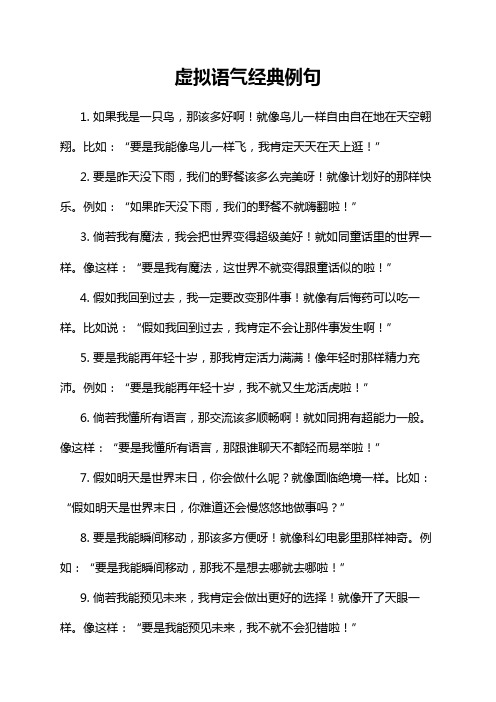
虚拟语气经典例句
1. 如果我是一只鸟,那该多好啊!就像鸟儿一样自由自在地在天空翱翔。
比如:“要是我能像鸟儿一样飞,我肯定天天在天上逛!”
2. 要是昨天没下雨,我们的野餐该多么完美呀!就像计划好的那样快乐。
例如:“如果昨天没下雨,我们的野餐不就嗨翻啦!”
3. 倘若我有魔法,我会把世界变得超级美好!就如同童话里的世界一样。
像这样:“要是我有魔法,这世界不就变得跟童话似的啦!”
4. 假如我回到过去,我一定要改变那件事!就像有后悔药可以吃一样。
比如说:“假如我回到过去,我肯定不会让那件事发生啊!”
5. 要是我能再年轻十岁,那我肯定活力满满!像年轻时那样精力充沛。
例如:“要是我能再年轻十岁,我不就又生龙活虎啦!”
6. 倘若我懂所有语言,那交流该多顺畅啊!就如同拥有超能力一般。
像这样:“要是我懂所有语言,那跟谁聊天不都轻而易举啦!”
7. 假如明天是世界末日,你会做什么呢?就像面临绝境一样。
比如:“假如明天是世界末日,你难道还会慢悠悠地做事吗?”
8. 要是我能瞬间移动,那该多方便呀!就像科幻电影里那样神奇。
例如:“要是我能瞬间移动,那我不是想去哪就去哪啦!”
9. 倘若我能预见未来,我肯定会做出更好的选择!就像开了天眼一样。
像这样:“要是我能预见未来,我不就不会犯错啦!”
10. 假如时间可以停止,那该是多么奇妙的事啊!就像进入了一个奇幻的世界。
比如说:“假如时间可以停止,那一切不都静止啦!”
我觉得虚拟语气真的很神奇,可以让我们想象出很多不可能的事情,给我们的思维带来无限的可能!。
2024届高考英语读后续写情绪表达高阶九式(07)虚拟语气讲义素材

总论:虚拟语气主要用来表示假设,所陈述的是一个条件,不一定是事实,也有可能与事实完全相反。
虚拟语气通过谓语动词的特殊形式来表示,常用来表达惊异、惋惜、遗憾、理应如此等含义,在写作中可以用来表达比较强烈的感情。
二、写作素材:1.没有你的帮助,我不会成功。
I couldn't have succeeded without your helpWithout your help, I would not have succeed.要不是你的指导,我不会取得如此大的进步。
But for your guidance, I would not have made such great progress Without your instruction, I would not have made such great success.要是我当时没有那么粗心就好了!If only I hadn't been so careless!If only I hadn't been so careless at the time !4.我无言以对,真希望我早点把真相告诉Jack.I'm speechless. I wish I had told Jack the truth sooner.l was speechless, wishing that I had told Jack the truth sooner.Steven尴尬地低下头,真希望刚才没有口误。
Steven looked down awkwardly. I hope I didn't slip upSteven lowered his head with embarrassment, wishing he hadn't made that slip of tongue.5.伙伴们都在到处跑着,玩得很开心,可Susan 却独自坐在草坪上,希望自己此刻在家里。
虚拟语气写作文例子
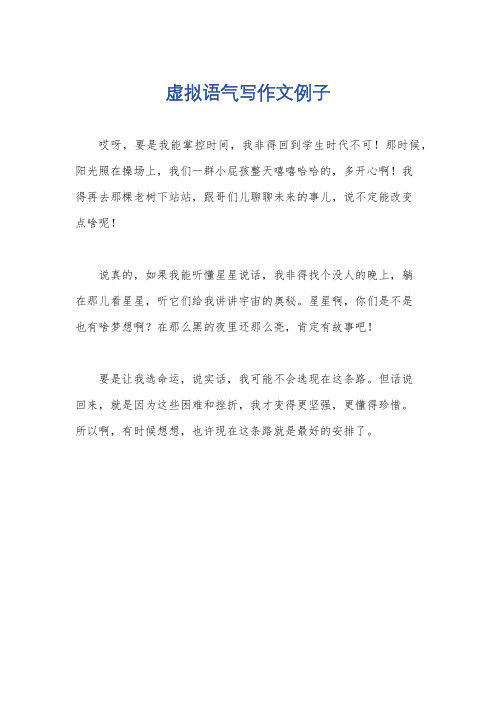
虚拟语气写作文例子
哎呀,要是我能掌控时间,我非得回到学生时代不可!那时候,阳光照在操场上,我们一群小屁孩整天嘻嘻哈哈的,多开心啊!我
得再去那棵老树下站站,跟哥们儿聊聊未来的事儿,说不定能改变
点啥呢!
说真的,如果我能听懂星星说话,我非得找个没人的晚上,躺
在那儿看星星,听它们给我讲讲宇宙的奥秘。
星星啊,你们是不是
也有啥梦想啊?在那么黑的夜里还那么亮,肯定有故事吧!
要是让我选命运,说实话,我可能不会选现在这条路。
但话说
回来,就是因为这些困难和挫折,我才变得更坚强,更懂得珍惜。
所以啊,有时候想想,也许现在这条路就是最好的安排了。
写作如何使用虚拟语气

写作如何使用虚拟语气虚拟语气是英语中一种特殊的语法现象,用于表达与事实相反、与现实不符合或者虚拟的情况。
在写作中,使用虚拟语气可以增加句子的变化和表达的层次,使文章更加丰富有趣。
本文将详细探讨写作中如何正确使用虚拟语气。
一、虚拟条件句虚拟条件句常用于表达假设、愿望、建议等情况。
其基本句型为:如果+主语+动词的过去式,主语+would/could/should/might/oughtto+动词原形。
例如:- If I were rich, I would travel around the world.(如果我有钱,我会环游世界。
)- If he had studied harder, he could have passed the exam.(如果他学得更努力,他本可以通过考试的。
)注意,在虚拟条件句中,虚拟的动作或情况与现实相反或不可能实现,因此要使用过去式或过去完成时来表示。
二、虚拟表达愿望虚拟语气也常用于表达对现实情况的不满、愿望或建议。
常用的句型包括:- I wish/If only+主语+过去式(与现在事实相反)- I wish/If only+主语+had+过去分词(与过去事实相反)- I would rather+主语+过去式/过去完成时+(that)从句(表示偏好)例如:- I wish I had a car.(我希望我有一辆车。
)- If only I were taller.(要是我个子再高点该多好。
)- I would rather you came tomorrow.(我宁愿你明天来。
)注意,在虚拟表达愿望时,要根据具体情况选择使用过去式、过去完成时或模态动词。
三、虚拟表达建议虚拟语气还可用于表达建议、要求或命令。
常用的句型包括:- It is suggested/recommended/important/vital+that+主语+动词原形- It is demanded/required/necessary+that+主语+动词原形例如:- It is suggested that he take a break.(建议他休息一下。
作文常用虚拟语气模板
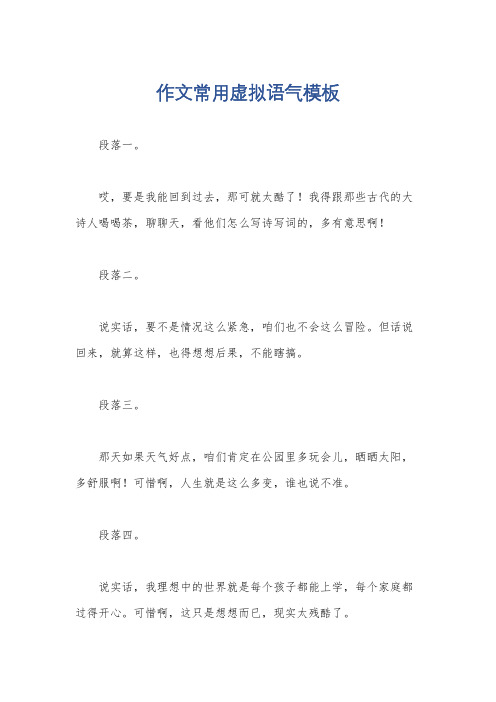
作文常用虚拟语气模板
段落一。
哎,要是我能回到过去,那可就太酷了!我得跟那些古代的大诗人喝喝茶,聊聊天,看他们怎么写诗写词的,多有意思啊!
段落二。
说实话,要不是情况这么紧急,咱们也不会这么冒险。
但话说回来,就算这样,也得想想后果,不能瞎搞。
段落三。
那天如果天气好点,咱们肯定在公园里多玩会儿,晒晒太阳,多舒服啊!可惜啊,人生就是这么多变,谁也说不准。
段落四。
说实话,我理想中的世界就是每个孩子都能上学,每个家庭都过得开心。
可惜啊,这只是想想而已,现实太残酷了。
段落五。
要是没这疫情,咱们现在可能都实现梦想了。
但现实和理想总是差那么一点,咱们得学会面对困难,找到出路才行。
高考英语作文虚拟语气运用
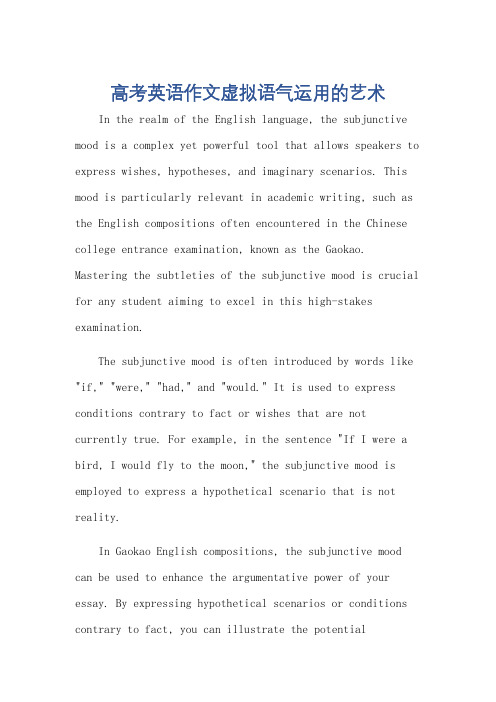
高考英语作文虚拟语气运用的艺术In the realm of the English language, the subjunctive mood is a complex yet powerful tool that allows speakers to express wishes, hypotheses, and imaginary scenarios. This mood is particularly relevant in academic writing, such as the English compositions often encountered in the Chinese college entrance examination, known as the Gaokao. Mastering the subtleties of the subjunctive mood is crucial for any student aiming to excel in this high-stakes examination.The subjunctive mood is often introduced by words like "if," "were," "had," and "would." It is used to express conditions contrary to fact or wishes that are notcurrently true. For example, in the sentence "If I were a bird, I would fly to the moon," the subjunctive mood is employed to express a hypothetical scenario that is not reality.In Gaokao English compositions, the subjunctive mood can be used to enhance the argumentative power of your essay. By expressing hypothetical scenarios or conditions contrary to fact, you can illustrate the potentialconsequences of a particular action or policy. This not only adds depth and sophistication to your writing but also demonstrates your ability to think critically and analytically.Moreover, the subjunctive mood can be used to express personal opinions and wishes in a more polite and indirect manner. For instance, instead of saying "I think it'sunfair that students have to study so hard," you can phrase it as "If only students didn't have to study so hard, it would be more equitable." This phrasing softens the tone and makes your opinion more palatable to the reader.However, it is important to note that the overuse of the subjunctive mood can make your writing sound unnatural and stilted. Therefore, it is crucial to strike a balance between using the subjunctive mood effectively and avoiding its overuse.In conclusion, the subjunctive mood is a valuable tool in the arsenal of any English writer, especially those preparing for the Gaokao. By mastering its use, students can enhance the quality and impact of their compositions, demonstrating not only their proficiency in the languagebut also their ability to think critically and express themselves eloquently.**高考英语作文虚拟语气运用的艺术**在英语语言中,虚拟语气是一种复杂却强大的工具,它允许说话者表达愿望、假设和虚构的场景。
虚拟语气写作文例子

虚拟语气写作文例子
《假如我能回到过去》
哎呀呀,如果我能回到过去,那可就太有意思啦!我就说说我上次参加运动会的事儿吧。
记得那次运动会,我报名参加了 400 米跑。
比赛前一天晚上,我那个紧张呀,翻来覆去睡不着,心里一直想着第二天可千万不能跑砸了呀。
第二天到了赛场,看着那么多人,我的腿都有点发软了。
“砰”的一声枪响,比赛开始啦!我撒开腿就跑,一开始还觉得自己跑得挺快的,可没一会儿就觉得气喘吁吁了。
我当时就想啊,假如我能回到前一天晚上,我一定好好睡一觉,养足精神。
要是那样的话,我现在肯定能跑得更轻松更快呀。
我咬着牙坚持跑着,感觉每一步都好艰难。
我又想,假如我之前能多练练耐力,现在也不至于这么累呀。
看着旁边的对手一个个超过我,我那个着急呀,真希望时间能倒流,让我重新来一次,我肯定会提前做好各种准备。
最后,我跑完了全程,虽然成绩不太理想,但也算是一次难忘的经历啦。
要是能有虚拟语气这神奇的东西,让我回到过去重新来过,那该多好呀!嘿嘿,这就是我关于虚拟语气的一个小幻想啦,虽然不太可能实现,但想想也挺好玩的呢。
虚拟语气高考作文
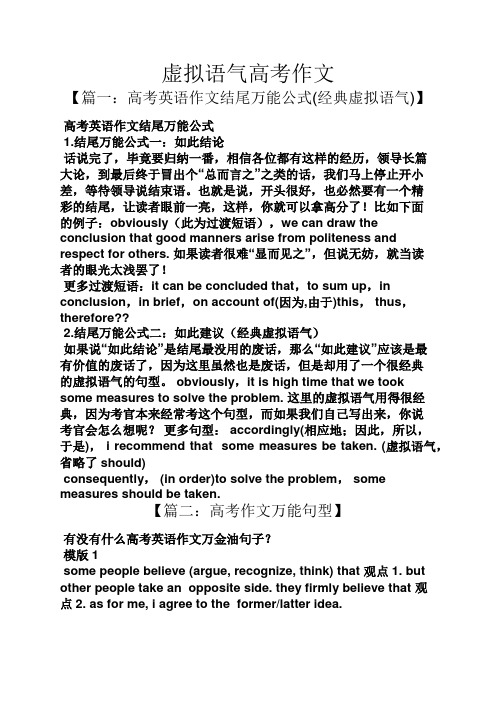
虚拟语气高考作文【篇一:高考英语作文结尾万能公式(经典虚拟语气)】高考英语作文结尾万能公式1.结尾万能公式一:如此结论话说完了,毕竟要归纳一番,相信各位都有这样的经历,领导长篇大论,到最后终于冒出个“总而言之”之类的话,我们马上停止开小差,等待领导说结束语。
也就是说,开头很好,也必然要有一个精彩的结尾,让读者眼前一亮,这样,你就可以拿高分了!比如下面的例子:obviously(此为过渡短语),we can draw the conclusion that good manners arise from politeness and respect for others. 如果读者很难“显而见之”,但说无妨,就当读者的眼光太浅罢了!更多过渡短语:it can be concluded that,to sum up,in conclusion,in brief,on account of(因为,由于)this, thus,therefore??2.结尾万能公式二:如此建议(经典虚拟语气)如果说“如此结论”是结尾最没用的废话,那么“如此建议”应该是最有价值的废话了,因为这里虽然也是废话,但是却用了一个很经典的虚拟语气的句型。
obviously,it is high time that we tooksome measures to solve the problem. 这里的虚拟语气用得很经典,因为考官本来经常考这个句型,而如果我们自己写出来,你说考官会怎么想呢?更多句型: accordingly(相应地;因此,所以,于是), i recommend that some measures be taken. (虚拟语气,省略了should)consequently, (in order)to solve the problem, some measures should be taken.【篇二:高考作文万能句型】有没有什么高考英语作文万金油句子?模版1some people believe (argue, recognize, think) that 观点1. but other people take an opposite side. they firmly believe that 观点2. as for me, i agree to the former/latter idea.there are a dozen of reasons behind my belief. first of all, 论据1.more importantly, 论据2.most important of all, 论据3.in summary, 总结观点. as a college student, i am supposed to 表决心. 或 from above, we can predict that 预测.模版2people hold different views about x. some people are of the opinion that 观点1, while others point out that 观点2. as far as i am concerned, the former/latter opinion holds more weight. for one thing, 论据1.for another, 论据2.last but not the least, 论据3.to conclude, 总结观点. as a college student, i am supposed to 表决心. 或 from above, we can predict that 预测.模版3there is no consensus of opinions among people about x(争论的焦点). some people areof the view that 观点1, while others take an opposite side, firmly believing that 观点2. as far as i am concerned, the former/latter notion is preferable in many senses. the reasons are obvious.first of all, 论据1.furthermore, 论据2.among all of the supporting evidences, one is the strongest. that is, 论据3.a natural conclusion from the above discussion is that总结观点.as a college student, i am supposed to 表决心.或 from above, we can predict that 预测.图表式作文it is obvious in the graphic/table that the rate/number/amount of y hasundergone dramatic changes. it has goneup/grown/fallen/dropped considerably in recent years (as x varies). at the point of x1, y reaches its peak value of ?(多少).what is the reason for this change? mainly there are ? (多少) reasons behind the situation reflected in the graphic/table. first of all, ?(第一个原因). more importantly, ?(第二个原因). most important of all, ?(第三个原因).from the above discussions, we have enough reason to predict what will happen in the near future. the trend described in the graphic/table will continue forquite a long time (if necessary measures are not taken括号里的使用于那些不太好的变化趋势).1.对立观点式a.有人认为x 是好事,赞成x,为什么?b.有人认为x 是坏事,反对x,为什么?c.我的看法。
- 1、下载文档前请自行甄别文档内容的完整性,平台不提供额外的编辑、内容补充、找答案等附加服务。
- 2、"仅部分预览"的文档,不可在线预览部分如存在完整性等问题,可反馈申请退款(可完整预览的文档不适用该条件!)。
- 3、如文档侵犯您的权益,请联系客服反馈,我们会尽快为您处理(人工客服工作时间:9:00-18:30)。
高分写作虚拟语气(政府类词汇)sense of security/safety 安全感freedom of the press 新闻自由gambling promoter 赌博庄家gossip 八卦information highway 信息高速公路marijuana 大麻media exposure 媒体曝光率paparazzi 狗仔队press intrusion 媒体侵扰privacy 隐私red light district 红灯区unbiased 无偏见的unprejudiced 公平的一、最基本的虚拟语气句型虚拟时间if从句谓语形式主句谓语形式现在did/were would(should,could,might) do过去had done/had been would(should,could,might)have done/been将来were to/should+do would(should,could,might) do1.虚拟现在时表示与现在事实相反的假设。
其if从句的谓语形式用动词的过去式(be一般用were), 主句用would/should/could/might +动词原型eg1. 如果赌博合法化,会引诱人们陷入没有结果的一夜暴富的幻想中If gambling were legalised, it would tempt people to fruitless fantasies of instant riches.2. 如果没有审查制度,信息高速公路可能会变成电子“红灯区”If there were no information censorship, the information highway would be in danger of becoming an electronic “red light district”。
2. 虚拟过去时是表示与过去事实相反的假设,if从句的谓语形式用过去完成时,即had+ 过去分词,主句用would/should/could/might+have+过去分词。
Eg. 1 如果发达国家过去没有捐赠不计其数的救援物资,发展中国家成百上千的穷人就会死于饥饿或传染病。
If developed countries had not donated countless relief materials, millions of poor people in developing countries would have died of hunger or infectious diseases.2. 如果中国没有审查网络,那么青少年就会接触到不雅的材料, 例如暴力与色情If China had not censored the internet, minors could have been exposed to indecent materials such as violence and pornography.3. 虚拟将来时是表示对将来事实可能相反的假设。
if从句的谓语形式用一般过去式或用were to/should + 动词原形,主句用would/should/could/might + 动词原形eg1. 如果吸食毒品合法化,警察大量的时间就将用于解决更严重的问题If drug use were to be legalised, considerable police time could be spent in dealing with other more serious problems.2. 如果西方国家停止资助第三世界国家,第三世界国家会寻求经济独立。
If western countries should stop financing the Third World, it would struggle for its economic independence.4. 省略if采用倒装语序的条件句有时可以吧含有助动词、情态动词、be或have的虚拟条件句中的连词if省去,而将had,should,were等词提到主语之前,即用倒装结构。
**如果没有had,should,were等词,既不能省略if, 也不能倒装。
eg1. 如果没有关于名流的八卦新闻,人们会不满意,媒体也失去娱乐性。
原句:If there should be no gossip about celebrities, people would not be satisfied and the media would be less entertainging.=>Should there be no gossip about celebrities, people would not be satisfied and the media would be less entertainging.2. 如果实施严厉的惩罚,交通违章者人数会急剧下降。
原句:If strict penalty were to be implemented, the number of traffic violators would drop significantly.=>Were strict penalty to be implemented,the number of traffic violators would drop significantly.3. 如果狗仔队没有在巴黎追踪戴安娜王妃,她就不会死于车祸。
原句:If paparazzi had not trailed Princess Diana in Paris, she would not have been killed in the car accident.=>Had paparazzi not trailed Princess Diana in Paris, she would not have been killed in the car accident.*5.有时虚拟条件句用介词短语otherwis,or, without, but for(如果没有,要不是)来引导(形式上的虚拟语气)eg1. 公众场合应该安装更多的监视装置(surveillance devices),否则市民没有安全感。
More surveillance devices should be fixed in public areas; otherwise citizens would not have a sense of security.2. 如果(but for/without)没有媒体,演员们会因为没有足够的媒体曝光率而成不了超级巨星。
But for/Without the press, actors and actresses might not have enough media exposure to become superstars.二、名词性从句中的虚拟语气I. 在表示要求(request, require, , demand, insist)、命令(stipulate, urge, command, grant, order) 、想法(prefer, agree, decide, determine)、建议(propose, suggest, advise,indicate, vote) 等的动词后的从句里,如果用should+动词原形,should可以省略。
如:eg1. 有人建议吧大麻合法化,以便政府可以通过征税管理这种毒品。
It is advised that marijuana (should)be legalised so that the government might regulate the drug by imposing taxes.2. 观众要求媒体每天提供没有偏见、公平的信息。
The audience demand that the media (should) provide unbiased and unprejudiced information every day.3. 许多市民要求酒吧在凌晨一点钱关门。
Many citizens require that the bars (should) be closed before 1 a.m.4. 赌博支持者坚持认为赌博应该被合法化,这样可以为周围商家创造收入,同时为当地居民提供就业机会。
支持者(proponent/advocate/supporter/backer)Gambling proponents insist that gambling (should) be legalized to generate income for surrounding businesses and provide job opportunities for local residents.II. 在表示要求(request, requirement, , demand, insistence)、命令(stipulation, command, order) 、想法(preference, agreement, decision, determination)、建议(proposal, suggestion, advice,indication) 等的名词后的从句里,如果用should+动词原形,should可以省略eg1. 赌博合法化的赞成者(拥护者)建议政府通过宣布赌博合法化来打击非法赌博。
Legalisation advocates’suggestion is that the government (should) fight illegal gambling by declaring gambing legal.2. 堕胎支持者认为是否堕胎应该留给当事人决定。
Abortion backers make the proposal that to abort or not (should)be left to the woman to decide.III. 在It is/was + 形容词后的that 从句中如果用should的结构,should可以省略。
这类形容词常见的有:表示“建议的”advisable, preferable, recommended, desirable, eager表示“紧急的”anxious, urgent,表示“必须的”crucial, essential, vital, necessary, obligatory,compulsory, imperative,表示“可能的”“合适的”possible, impossible probable, , (improper, important, natural)eg1. 富国当然有义务帮助穷国It is natural that wealthier countries (should)have the obligation to assist their less wealthy counterparts.2. 政府有必要采取“审查互联网”的方法防止未成年人接触到不良内容。
